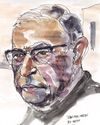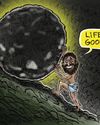
The Greek word τέχνη, ‘techne’, which is usually translated as ‘art’, ‘craftsmanship’, ‘knowledge’, or ‘skill’, is generally used to designate the creation of something. In ancient philosophy, however, techne was not just perceived as an activity, but above all as a kind of knowledge. For Plato, who was the first to elaborate on this concept in writing, techne and episteme, art and knowledge, were closely related. Also for Aristotle, techne was a kind of knowledge that goes with a certain form of creative activity. According to him, the goal for the individual craftsman is to achieve as perfect an imitation of nature as possible – although he was well aware of the impossibility of creating exact copies. Techne in this classic sense – and this cannot be emphasized enough when comparing ancient and modern technology – is basically focused on individual work instead of on the streamlined production of many objects of the same kind in order to make a profit. Mass production would be inconceivable to the ancient craftsman, and not just for technical reasons.
Diese Geschichte stammt aus der August/September 2023-Ausgabe von Philosophy Now.
Starten Sie Ihre 7-tägige kostenlose Testversion von Magzter GOLD, um auf Tausende kuratierte Premium-Storys sowie über 8.000 Zeitschriften und Zeitungen zuzugreifen.
Bereits Abonnent ? Anmelden
Diese Geschichte stammt aus der August/September 2023-Ausgabe von Philosophy Now.
Starten Sie Ihre 7-tägige kostenlose Testversion von Magzter GOLD, um auf Tausende kuratierte Premium-Storys sowie über 8.000 Zeitschriften und Zeitungen zuzugreifen.
Bereits Abonnent? Anmelden

The Two Dennises
Hannah Mortimer observes a close encounter of the same kind.

Heraclitus (c.500 BC)
Harry Keith lets flow a stream of ideas about permanence and change.

Does the Cosmos Have a Purpose?
Raymond Tallis argues intently against universal intention.

Is Driving Fossil-Fuelled Cars Immoral?
Rufus Duits asks when we can justify driving our carbon contributors.

Abelard & Carneades Yes & No
Frank Breslin says 'yes and no' to presenting both sides of an argument.

Frankl & Sartre in Search of Meaning
Georgia Arkell compares logotherapy and atheistic existentialism.

Luce Irigaray
Luce Irigaray, now ninety-two years old, was, among many other things, one of the most impactful feminists of the 1970s liberation movements - before she was marginalised, then ostracised, from the francophone intellectual sphere.

Significance
Ruben David Azevedo tells us why, in a limitless universe, we’re not insignificant.

The Present Is Not All There Is To Happiness
Rob Glacier says don’t just live in the now.

Philosophers Exploring The Good Life
Jim Mepham quests with philosophers to discover what makes a life good.